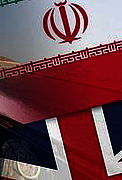Iran and UK on Verge of Diplomatic Break
» The Ambassador who Can’t Return
The Islamic republic of Iran and the UK are on the verge of fully breaking their diplomatic relations. With the appointment of the current British ambassador to Tehran Simon Gass as the new NATO representative to Afghanistan, Iranian authorities announced that they were banning his return to Iran altogether.
The deputy chairman of the national security and foreign policy committee of the Majlis cleric Hossein Ebrahimi announced two days ago, “Following the undermining behavior of the British ambassador in Iran and his appointment as the most senior non-military NATO official to Afghanistan, he is barred from returning to Iran, and so with his departure, he cannot return to the country.”
Pointing to an article that the ambassador had inked discussing Iran’s violation of human rights, Ebrahimi said “the sentiments of the Iranian nation had been hurt” and asserted that, “the aggressive behavior of the British ambassador and the inimical actions of the British government against the Islamic republic have resulted in a review of a bill to lower the level of Iran-British relations in the national security commission and the call for the expulsion of the British ambassador.”
These remarks by the Majlis representative come after the British envoy was appointed as the new NATO Senior Civilian Representative in Afghanistan and contradict the claims that he was expelled by Iran.
Prior to this, NATO had announced that Gass would replace British Mark Sedwille who till February 2010 was the highest non-military official of the alliance in Afghanistan.
In his comments, Ebrahimi also said that the ambassador was non-grata and did not have the right to return to Iran, calling the ambassador’s “undermining” activities as the reason for this decision by the Islamic republic.
In addition, the head of the same Majlis committee labeled the British ambassador as “ineffective” and claimed that his appointment was a cover by the British government to remove the envoy from Tehran.
Alaeddin Borujerdi, the head of the national security and foreign policy committee declared his “pleasure” over the exit of the British ambassador and added that he had not accomplished anything and that, “since the Islamic republic did not have an ambassador in the UK, our country had long ago sent this message to the British that with the policies of the British towards Iran, there was no sense in having an ambassador from an inimical country.”
Responding to a question by a Fars news agency reporter who asked whether he was pleased or not that Britain would no longer have an ambassador in Tehran, Borujerdi said, “We welcome this situation.”
Continuous Turmoil in Iran-UK Relations
Relations between the Islamic republic and the UK have been turbulent since the 1979 revolution. At the height of the 8-year Iran-Iraq war, Britain’s foreign office removed its entire embassy staff from Tehran.
In 1988, relations were re-established but following ayatollah Khomeini’s fatwa calling for the murder of British writer Salman Rushdie, EU ambassador’s decided to recall their ambassadors from Tehran in protest to the edict. So the British removed all their staff from the embassy again and the embassy was almost shut.
Following the election of Mohammad Khatami as the new president of Iran and the beginning of a new phase in Iran’s foreign posture, members of the EU returned their ambassadors to Tehran. In 1999 as foreign ministers Robin Cooke and Kamal Kharazi met in New York during the UN General Assembly gathering, relations between Iran and the UK were once again restored to ambassadorial level.
But following the election of a new president in Iran in 2005, relations between the two states again plummeted. Following the elections, ayatollah Khamenei called the British government the “dirtiest enemy” of the Iranian regime and a large number of British embassy staff in Tehran were arrested and imprisoned by Iran’s security forces.
The Bill to Completely Break the Diplomatic Ties
Simon Gass, who had presented his Letters of Credence to Ahmadinejad on September 13, 2009, generally had difficult days in Tehran but the worst was when he wrote a piece on the embassy website on Nasrin Sotudeh, the Iranian human rights attorney and activist. In that piece the envoy accused the Islamic republic of violating human rights and said that Sotudeh’s crime was her “brave defense of human rights,” calling for her release. This gesture brought forth a very negative response by a large group of Iranian officials and pro-government political groups who called for the expulsion of the envoy from Iran and the complete break in the diplomatic ties between the two governments.
In this light, the Majlis committee on national security and foreign policy passed a bill for the complete break in diplomatic relations with the British government.
Another member of the Majlis committee threw light on the decision by saying that “the bill to reduce diplomatic ties between Iran and the UK was discussed by members of the national security committee in the presence of officials from the ministry of foreign affairs and intelligence ministry, and other agencies for three and a half hours and members of the committee suggested the complete break in ties with Britain for the remarks of the ambassador over which a vote was taken and the majority called for the severance of the ties.”
Earlier, Raja news agency close to supporters of the administration had written that Gass’s appointment to Afghanistan was a “preventive measure” against the Majlis bill.
The Islamic republic has not had an ambassador in London since September 2010 while Safar-Ali Eslamian Koobai was the charge of the embassy.


